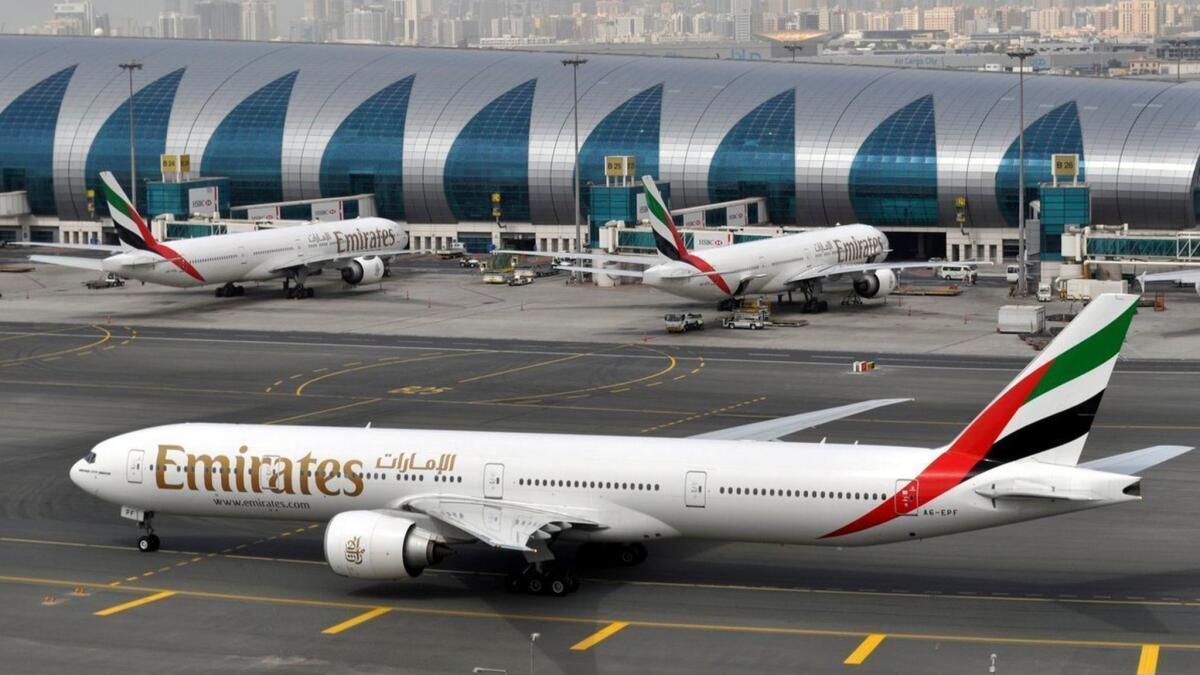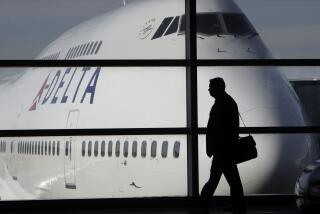Emirates cuts flights to U.S., citing less demand under Trump’s policies

- Share via
Reporting from DUBAI, United Arab Emirates — Emirates, the Middle East’s biggest airline, said Wednesday that it is cutting flights to the United States because of a drop in demand caused by heightened U.S. security measures and Trump administration attempts to ban travelers from several Muslim-majority nations.
The decision by the Dubai government-owned airline is the strongest sign yet that tougher measures imposed on U.S.-bound travelers from the Middle East are taking a financial toll on fast-growing Persian Gulf carriers that have expanded rapidly in the United States in recent years.
Dubai was one of 10 cities in Muslim-majority countries affected by a ban on laptops and other personal electronics in carry-on luggage aboard U.S.-bound flights.
Emirates’ hub at Dubai International Airport, the world’s third busiest, is a major transit point for travelers who were affected by President Trump’s executive orders temporarily halting entry to citizens of six countries.
The latest travel ban suspended new visas for people from Iran, Libya, Somalia, Sudan, Syria and Yemen, and froze the nation’s refugee program. Like an earlier ban that also included Iraqi citizens, it has been blocked from taking effect by the courts.
Emirates said the reductions will affect five of its 12 U.S. destinations, starting next month. It called the move “a commercial decision in response to weakened travel demand” in the three months since Trump took office.
“The recent actions taken by the U.S. government relating to the issuance of entry visas, heightened security vetting, and restrictions on electronic devices in aircraft cabins, have had a direct impact on consumer interest and demand for air travel into the U.S.,” the carrier said.
Emirates did not provide financial data for its U.S. operations but said it had seen “healthy growth and performance” there until the start of the year.
But in the three months Trump has been in office, the airline said, there has been “a significant deterioration in the booking profiles on all our U.S. routes, across all travel segments.”
“Emirates has therefore responded as any profit-oriented enterprise would, and we will redeploy capacity to serve demand on other routes on our global network,” it said.
The cuts will reduce the number of U.S.-bound flights from the carrier’s Dubai hub to 101, down from 126.
Twice-daily Emirates flights to Los Angeles, Seattle and Boston will be reduced to once a day. Daily flights to Fort Lauderdale and Orlando, Fla., will be pared down to five a week.
Like its smaller Persian Gulf rivals Qatar Airways and Abu Dhabi-based Etihad Airways, Emirates has ramped up its U.S. presence in recent years and recently launched a new service to Newark, N.J., via Athens.
Several big U.S. carriers have bristled at the Persian Gulf airlines’ American push, accusing them of flooding the market with capacity while receiving billions of dollars of unfair government subsidies. The Persian Gulf airlines deny the allegations.
Delta Air Lines and United Airlines both stopped flying to Dubai last year, leaving Emirates as the only carrier to offer direct U.S. flights to what has become the world’s busiest airport for international traffic.
ALSO
‘Congrats, you survived the Boston Marathon!’: Adidas apologizes for ‘insensitive’ email
United Airlines’ CEO vows the airline will learn and grow after passenger-dragging fiasco
Tech industry is fine with H-1B visa reform — as long as it doesn’t affect their companies
UPDATES:
9 a.m.: This article was updated with additional comments from Emirates and with background information about other Persian Gulf-based and U.S.-based airlines.
This article was originally published at 7:55 a.m.
More to Read
Sign up for Essential California
The most important California stories and recommendations in your inbox every morning.
You may occasionally receive promotional content from the Los Angeles Times.










